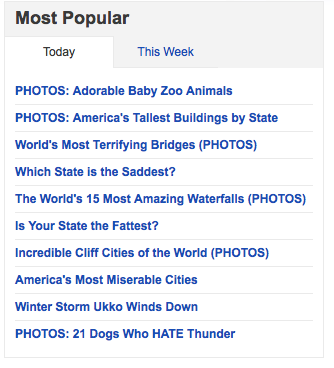Poynter’s Andrew Beaujon reports this internal want ad for the Washington Post‘s once-vaunted Style section:
This blogger should be able to identify trends, cutting through the noise of the Internet to bring context and perspective to a Washington audience. We envision at least a dozen pieces of content per day, with the knowledge that one great sentence can equal one great post. This assignment requires not only the ability to aggregate content, but the skill to execute the types of stories that others will aggregate and share. We are looking for someone who will not just be part of the cultural conversation, but lead it.
This is a job that will require early mornings to get a start on the day’s news and may sometimes require late nights covering awards shows and other live events.
Because nothing says “cutting through the noise of the Internet” like another dozen blog posts a day added to the din written by someone working early morning and late nights.
And if you read too many one-sentence blog posts on the Washington Post‘s website–which can have load times that recall the old 2400 baud days–you’re going to be an unhappy reader.
— The Post‘s hamsters will never be able to compete with the work done by the folks at The Weather Channel’s website, as compiled by Alana Horowitz at her Tumblr wtf weather.com.
Weather.com is clicks-model news taken to its logical conclusion, featuring such classics of the genre as this:
The lede of that story is, “Rumors that the world is coming to an end this month are greatly exaggerated, according to NASA officials,” and you have to click through six pages–each of which has two short paragraphs–to read the whole thing.
Here are the top 10 stories on NBC News cousin weather.com right now:

— You don’t read very many columns in praise of bureaucracy, and the last place you’d expect to find one is in The Wall Street Journal.
But here it is:
Ryan Chittum is a former Wall Street Journal reporter, and deputy editor of The Audit, CJR’s business section. If you see notable business journalism, give him a heads-up at rc2538@columbia.edu. Follow him on Twitter at @ryanchittum.… we all confront bureaucratic constraints that, it often seems, are designed mostly to sap our initiative and prevent us from actually getting stuff done.
The unfortunate reality is that this is exactly the way it should be. The existence of rules and regulations, and the bureaucrats who enforce them, means that less good stuff gets done–but it also puts a check on the kinds of initiatives that can lead to catastrophe…
The absence of bureaucracy at startup companies is not necessarily a sign that they are better-managed than established firms; it just means that they have less to lose if they screw up.
By the same token, many government functions may be laden with bureaucracy, but the private sector might not do any better with the same tasks. Like the makers of baby products, governments deal with uniquely sensitive problems, from ensuring that terrorists never get past airport security to keeping deadly germs out of the food supply.


